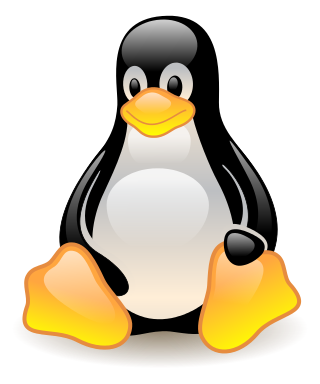Version en español

Mascota del Kernel Linux "Tux" Atribución [email protected] Larry Ewing y The GIMP Source
¡Saludos comunidad! Este es mi primer post en el que hablaré de la experiencia que he tenido con los sistemas operativos basados en GNU/Linux. Es un terreno que tardé bastante en explorar, de niño tenía una idea muy vaga de lo que significaba el software libre, pues eventualmente había escuchado de ello en la televisión o en clases de la escuela. El momento en el que entré en un profundo contacto con GNU/Linux fue en mi etapa de adolescencia, en el año 2014 cuando estudiaba en bachillerato. Recibí una computadora portátil escolar de bajo costo basada en Intel Classmate que aquí en mi país Venezuela llegó bajo el nombre "Canaima". Esta computadora vino equipada con un sistema operativo basado en Debian GNU/Linux preinstalado, y varias aplicaciones que incluían el programa educativo del bachillerato.
Esta no fue la primera vez que di un salto a un sistema operativo diferente al acostumbrado, en mi casa inicialmente usábamos computadoras Mac, y por allá en el año 2007 empezamos a usar Windows en una PC que mis padres habían comprado. Si dicho salto se sintió extraño, el salto a GNU/Linux fue mucho mas extraño todavía.
Ahora habían programas con nombres poco resonantes, interfaces más o menos familiares, el método para instalar aplicaciones nuevas es diferente, y descubrí que muchas aplicaciones que usaba en mi día a día no eran compatibles. Parecía que sobrevivir en estas tierras nuevas iba a ser complicado, me alegra saber que al final estuve equivocado y que en realidad todo se vuelve más fácil en cuanto te das cuenta de que GNU/Linux es tan flexible y personalizable como un carro al que puedes cambiarle las ruedas, el motor, el chasis, etc.

Quiero hacer una mención importante a mi primo Adrián Prado (apradoc), un diseñador gráfico con más de 17 años de experiencia como usuario GNU/Linux y promotor del conocimiento libre. Él ha estado involucrado en proyectos libres como Caciquitxs Educativo, conferencias de software libre con Joomla, Juuntos, y administrando servidores basados en Nethserver y mucho más. Como mi papá sabía que él estaba dedicado a esas actividades me lo dejó como referencia para pedir ayuda, hice contacto con él y se convirtió en mi primer guía de este mundo. Una de las primeras cosas que me enseñó fue a entrar en contacto con las comunidades, abrí un Telegram, y descubrí un sinfín de grupos súper activos con gente increíble dispuesta a ayudar. Si eres nuevo en GNU/Linux viene super bien incorporarse en estas comunidades para consultar y asesorarse, si tienes algún conocido que usa estos sistemas también puedes conseguir apoyo a través de él, ya sea para aclarar dudas, solucionar problemas, o encontrarte grupos con gente que sepa más al respecto. La experiencia es tan satisfactoria que al final terminas ayudando de manera incondicional a otras personas, al menos así ha sido mi caso.
Ese rango tan alto de personalización que ofrece GNU/Linux es lo que permite que existan tantas variedades del mismo para todo tipo de necesidades, gustos y colores. Algunas distribuciones muy populares buscan parecerse a Windows, ya sea a nivel estético o a nivel de gestión de aplicaciones con tal de llegar a un público más amplio y que la curva de aprendizaje para la transición sea lo más reducida posible, un ejemplo con esas características es Ubuntu que está basada en Debian, también existe un entorno de escritorio llamado KDE Plasma que se parece mucho a nivel de interfaz. Luego de usar dichos sistemas, me di cuenta de que esas distribuciones no eran para mí. El hecho de que una distribución trate de asemejarse a un sistema con principios diferentes, lo hacía ver como algo forzado, a ser lo que no es, en la práctica daba la sensación de que usabas una copia inferior del sistema comercial popularmente usado. Adicionalmente en aquellos tiempos, Ubuntu/Debian tenían un problema técnico que dificultaba la personalización profunda debido a un conflicto de dependencia interna entre los componentes del sistema, ¡Ni se te ocurra tocar algo que tenga que ver con SystemD! que yo ya pasé por eso. Así que realmente no eran el mejor punto de partida para explorar el potencial de GNU/Linux, eso si, a día de hoy todavía son excelentes candidatos para usuarios nuevos que buscan una curva de aprendizaje pequeña.
Distribuciones DIY (Do It Yourself)
Esta es mi parte favorita de mi experiencia porque aquí es donde el usuario toma mayor protagonismo ¡Así es! En el párrafo anterior narré algunos detalles sobre lo que significó para mí el uso de distribuciones "amigables" para el usuario, muchas de esas cosas que no funcionaron eran responsabilidad de alguna que otra persona del grupo de desarrolladores que mantienen la distribución, pero aquí, en la categoría DIY (Do it yourself) un principio que en español está interpretado como "Primero hazlo, luego pide." el usuario es el que tiene la responsabilidad de construir sobre una base el sistema personalizado con los componentes que desee. Suena difícil ¿No? La buena noticia es que ¡no lo es! Mi primer sistema lo hice con base Arch Linux a punta de seguir cuidadosamente los pasos de una guía ¡El wiki de Arch Linux es excelente! Ahí puedes aprender mucho incluso para otras distribuciones. Logré construir un sistema funcional sin saber casi nada de sistemas salvo algunos comandos súper básicos. Lo cierto es que esto tiene una gran recompensa ¡Conoces mejor tu sistema! porque ves todo lo que hiciste para construirlo, omites la instalación de aplicaciones que probablemente nunca usarás, y podrás personalizarlo mejor con menos probabilidades de conflictos de dependencias.
Esta transición fue la más importante para mí, porque si bien pude conformarme con un sistema que funcionara y ya estuviera listo para hacer cualquier tarea, lo cierto es que esta práctica terminó reforzando mis ganas de conocer, personalizar, y optimizar mucho más mi sistema, lo cual, aparte de dejarme una base más sólida de cómo funciona GNU/Linux, me ha servido para tomar un mayor control de los procesos del sistema, y a través de todo este conocimiento sacar un mayor partido del hardware gama baja o viejo. Lo que al final se traduce también en un beneficio para nuestra economía familiar ya que no urge la necesidad de reemplazar con frecuencia o tirar equipos viejos ¡Logramos sacar provecho a equipos que ya tienen más de 6 años con nosotros y son hardware de casi 10 años de antiguedad! En mi casa todos están usando ahora GNU/Linux y cuentan con mi apoyo técnico incluyendo el mantenimiento de las computadoras.

Un dato curioso que llamó mi atención, cuenta el Linuxero y Youtuber Luke Smith en su blog, dejo link aquí del post, la sección "The Problem of Windows", lo siguiente
¿Cuántas veces has escuchado a una persona normal explicarte que su computadora es lenta porque es "muy vieja" y la compraron "allá por 2015"? Es una afirmación absurda, por supuesto. Las computadoras no se vuelven mágicamente lentas ... ... a menos que hayan estado ejecutando Windows.
El problema de los sistemas operativos privativos parecen radicar en el hecho de que empiezan a acumular basura en sus actualizaciones para crear la necesidad de comprar una PC nueva ya que la actual está lenta por "envejecimiento". Aunque no tengo forma de corroborar si eso es verdadero o no, lo cierto es que en mi experiencia eso ha resultado bastante real, efectivamente no he tenido ese problema con las máquinas que utilizan GNU/Linux, este sistema siempre ha ido rápido en hardware antiguo. Espero pronto hacer un post mas detallado sobre ese tema aprovechando que recientemente algunos familiares me han pedido que "reanime" algunos equipos viejos, un reto que sin duda será interesante.
En conclusión, estoy orgulloso de ser Linuxero. Casi todos los días estoy descubriendo cosas nuevas investigando por internet gracias a la filosofía del libre conocimiento que promueve GNU/Linux. Si te animas a probar este sistema quiero resaltar que hay muchas distribuciones que puedes probar sin necesidad de instalarlo o borrar tu sistema actual, lo que permite irse familiarizando sin abandonar lo que usas actualmente. Deseo compartir más con ustedes sobre estas aventuras ¡Hasta la próxima!
English version

Linux Kernel Mascot "Tux" Attribution [email protected] Larry Ewing and The GIMP Source
Greetings community! This is my first post in which I will talk about the experience I have had with GNU/Linux based operating systems. It is a terrain that took me quite a while to explore, as a kid I had a very vague idea of what free software meant, as I had eventually heard about it on TV or in school classes. The moment when I came into deep contact with GNU/Linux was in my teenage stage, in 2014 when I was studying in high school. I received a low-cost Intel Classmate-based school laptop that here in my country Venezuela came under the name "Canaima". This computer came equipped with a pre-installed Debian GNU/Linux based operating system, and several applications that included the high school educational program.
This was not the first time I made a leap to a different operating system than the one I was used to, in my house we initially used Mac computers, and back in 2007 we started using Windows on a PC that my parents had bought. If that leap felt strange, the leap to GNU/Linux was even stranger.
Now there were programs with less resonant names, more or less familiar interfaces, the method for installing new applications is different, and I discovered that many applications that I used in my day to day life were not compatible. It seemed that surviving in these new lands was going to be complicated, I'm glad to know that I was wrong in the end and that everything actually gets easier as soon as you realize that GNU/Linux is as flexible and customizable as a car that you can change the tires, the engine, the chassis, etc.

I want to make an important mention to my cousin Adrián Prado (apradoc), a graphic designer with more than 17 years of experience as a GNU/Linux user and promoter of free knowledge. He has been involved in free projects such as Caciquitxs Educativo, free software conferences with Joomla, Juuntos, and administering Nethserver based servers and much more. As my dad knew that he was dedicated to these activities he left him as a reference to ask for help, I made contact with him and he became my first guide to this world. One of the first things he taught me is to get to know and join communities, I opened a Telegram, and discovered an endless number of super active groups with amazing people willing to help. If you are new to GNU/Linux it's great to join these communities for consultation and advice, if you have someone you know who uses these systems you can also get support through them, either to clarify doubts, solve problems, or find groups with people who know more about it. The experience is so satisfying that it makes you want to help others unconditionally, at least that has been my case.
This high range of customization offered by GNU/Linux is what allows so many varieties of it to exist for all kinds of needs, tastes and colors. Some very popular distributions seek to resemble Windows, either aesthetically or at the level of application management in order to reach a wider audience and that the learning curve for the transition is as small as possible, an example with these features is Ubuntu which is based on Debian, there is also a desktop environment called KDE Plasma that is very similar at the interface level. After using those systems, I realized that those distributions were not for me. The fact that a distribution tries to resemble a system with different principles, made it look like something forced to be what it is not, in practice it gave the feeling that you were using an inferior copy of the popularly used commercial system. Additionally in those days, Ubuntu/Debian had a technical problem that made deep customization difficult due to an internal dependency conflict between system components, don't even think of touching anything to do with SystemD! I've been there. So they were not really the best starting point to explore the potential of GNU/Linux, although they are still excellent candidates for new users looking for a small learning curve.
DIY Distributions (Do It Yourself)
This is my favorite part of my experience because this is where the user takes the main role. That's right! In the previous paragraph I narrated some details about what it meant for me the use of "user friendly" distributions, many of those things that did not work were the responsibility of some other person or other of the group of developers that maintain the distribution, but here, in the DIY category (Do it yourself) the user is the one who has the responsibility to build on a base the customized system with the components that he/she wants. Sounds difficult, doesn't it? The good news is that it is not! My first system was built on the Arch Linux base by carefully following the steps of a guide. The Arch Linux wiki is excellent! There you can learn a lot even for other distributions. I managed to build a working system knowing almost nothing about systems except some super basic commands. You get to know your system better! because you see everything you did to build it, you skip installing applications you will probably never use, and you can customize it better with less chance of dependency conflicts.
This transition was the most important to me, because although I was able to settle for a system that works and was ready to do any task, the truth is that this practice ended up strengthening my desire to know, customize, and optimize much more my system, Which, apart from obtaining a more solid basis on how GNU/Linux works, has helped me to take greater control of the system processes, and through all this knowledge to get more out of low-end or old hardware. Which in the end also translates into a benefit for our family economy because we don't need to replace frequently or throw away old computers. We get to take advantage of computers that already have more than 6 years with us and are almost 10 years old hardware! In my house everyone is now using GNU/Linux and they count on my technical support including computer maintenance.

A curious fact that caught my attention, the Linux user and Youtuber Luke Smith says in his blog:
How many times have you heard a normie explain to you that their computer is slow because it's "really old" and they bought it "way back in 2015?" It's an absurd statement of course. Computers don't just get magically slow... ...unless they've been running Windows.
The problem with proprietary operating systems seems to lie in the fact that they start to accumulate garbage in their updates to create the need to buy a new PC because the current one is slow due to "aging". Although I have no way to corroborate if this is true or not, the truth is that in my experience this has been quite real, indeed I have not had this problem with machines using GNU/Linux, this system has always been fast on older hardware. I hope soon to make a more detailed post on that subject, taking advantage that recently some family members have asked me to "reencourage" some old computers, a challenge that will certainly be interesting.
In conclusion, I am proud to be a Linux user. Almost every day I am discovering new things by researching on the internet thanks to the philosophy of free knowledge that GNU/Linux promotes. If you dare to try this system I want to emphasize that there are many distributions that you can try without having to install it or delete your current system, which allows you to become familiar with it without abandoning what you are currently using. I look forward to sharing more with you about these adventures. See you next time!
¡Me encanta toda la explicación y me parece digno de destacar tu reconocimiento a quienes te introdujeron en la temática.
Es un tema que no es muy fácil, pero estoy seguro que pronto en Hive encontrarás tu nicho.
¡Éxitos!
¡Gracias padre mío! Gracias a tí por las recomendaciones y todo el apoyo!
¡Muy buen artículo! Qué bueno el proceso de cómo te fuiste involucrando con todo lo que abarca el sistema Linux y qué fino que hayas tenido tal interés en éste.
¡Gracias hermanito! Te envío un abrazo linuxero! :D
¡Felicidades! Esta publicación obtuvo upvote y fue compartido por @la-colmena, un proyecto de Curación Manual para la comunidad hispana de Hive que cuenta con el respaldo de @curie.
Si te gusta el trabajo que hacemos, te invitamos a darle tu voto a este comentario y a votar como testigo por Curie.
Si quieres saber más sobre nuestro proyecto, acompáñanos en Discord: La Colmena.